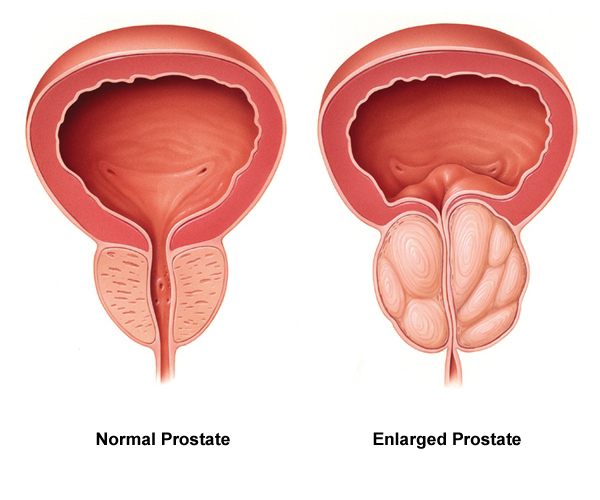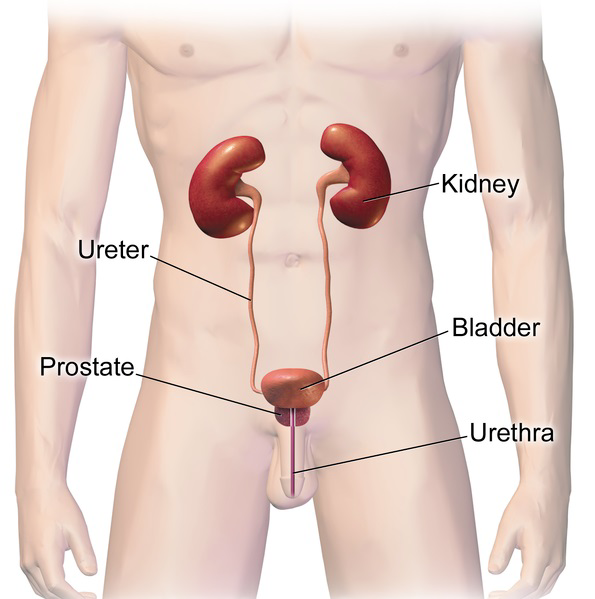A man can give anything to have a child but a man will everything to pass urine.
I started urology posting 25 days ago and the commonest condition of worry are issues regarding the prostate.
It's so bad that once you see an elderly man crying you are almost sure that he is having problems passing urine due to his enlarged prostate.
What is the prostate?
The prostate is a walnut-shaped organ in the body responsible for the production of semen which is fluid in the sperm.
The prostate is located beneath the bladder which is the organ that stores urine.
The urethra is a small tube that connects the bladder to the external environment. In essence, the urethra is a passage for urine out of the body.
The prostate surrounds the urethra at the bladder neck
The rectum is also behind the prostate.
What is prostatic enlargement?
The prostate is capable of growing like every other part of the body.
However, it is unique in that most of its growth occurs when one is ageing.
The prostate can grow in two patterns. It can either grow in a malignant pattern or a benign pattern or both.
The malignant pattern means cancerous growth.
This means that walnut-sized prostate can grow to be as big as a lemon

By Akcmdu9 - Own work, CC BY-SA 3.0, Wikimedia
What causes prostate enlargement?
There are two main causes of prostate enlargement
- Benign prostatic enlargement
- prostatic cancer.
Which people are at risk of having prostate enlargement?
Firstly, the prostate is a major organ and hence men are at risk of having a large prostate.
As grey hair comes with age so does prostatic enlargement.
It has been observed that at the age of 50 about 50% of men will have prostate enlargement.
At 85, 90% of men will have an enlarged prostate.
Also, genetics plays a role in most medical conditions. This implies that a positive family history of any of the types of prostate growth increases one's chance of having prostate enlargement.
Is there a higher chance of having prostate cancer if one has Benign prostatic enlargement?
The answer is No. Many men are most times worried about this but the truth is they occur independently of each other.
A person might have BPE and not have prostate cancer and another might have BPE and prostate cancer. While someone else can have prostatic cancer from the very beginning.
What are the early signs of prostatic enlargement?
The earliest sign of prostate enlargement is hesitancy before urinating and going to the toilet a lot at night.
Once you start experiencing these symptoms, it might be a pointer to prostate issues.
Most men complain of going to the toilet to urinate more than 6 times at might compared to going 2 times in the past.
Other symptoms include;
Urgency means the inability to hold urine for a short period. Most times when they have the urge to pass urine, they must go at that instance or else they would wet themselves.
Incomplete voiding; this is a feeling of still wanting to pass urine after completing the process. They always feel like there is something in there.
Weak stream: In later stages, they are not able to give a strong flow. For example, while growing up I could pee and it will hit the wall from a distance, however, their urine can't flow even with straining, the flow doesn't improve.
Sometimes, they start and stop several times in the process of urinating. This phenomenon is called intermittency.
Treatment of prostate enlargement
The treatment of prostate enlargement is dependent on a lot of factors.
Age, health, size of the prostate and symptoms are different factors that can help determine the treatment.
Are there lifestyle changes that can help improve symptoms of an enlarged prostate?
Yes, there are lifestyle modifications that help with the symptoms. They include;
- Reducing alcohol intake at night
- Reducing intake of caffeinated drinks - lowering the amount of fluid taken at night.
It is worth noting that these lifestyle modifications don't reduce the size of the prostate. They only reduce the severity of the symptoms.
Is surgery the only way to treat prostate enlargement?
The answer is No. There are medical ways to treat prostate enlargement
There are different ways to treat the prostate medically.
One of the ways include administering drugs that help relax the muscles of the prostate.
Also, some drugs help to reduce the size of the prostate.
The drugs may be used alone or in combination.
Drugs like tamsulosin and finasteride have been shown to improve symptoms and shrink the growth of the prostate.
What surgeries are done for prostate enlargement?
Different surgeries can cure an enlarged prostate
They include;
Transurethral resection of the prostate which involves removing a part of the prostate through the penile route.
Open prostatectomy; involves removal of the prostate through the abdominal route.
Orchidectomy; Some studies have shown that testosterone is responsible for the growth of the prostate.
The testis is also responsible for the production of testosterone.
Therefore, removal of the testis will invariably, reduce the growth of the prostate.
Are there natural ways of treating prostate enlargement?
Yes, there are natural ways however there are controversies in the studies available.
Saw palmetto is a herbal remedy used in the treatment of benign prostate enlargement.
Saw palmetto is gotten from the fruit of palm tree.
Like I earlier said, controversies are surrounding their use.
Studies have shown that saw palmetto can be compared to placebo
This means that we can't categorically say that using this extract can reduce the chances of getting Bpe.
Some Asian studies have also linked eating fruits and vegetables to shrinking prostate size too.

By BruceBlaus - File:Urinary_System_(Male)_(cropped).png, CC BY-SA 4.0, Wikipedia
Complications of Prostatic enlargement
Complications of prostate enlargement can range from life-threatening conditions to very mild conditions.
Mild ones include haematuria, difficulty with passing urine etc
Life-threatening ones include anaemia, paralysis, bone pain and even seizures when cancer metastasizes to the brain.
Chronic kidney can ensue from backflow pressure from the bladder.
Can prostate enlargement be prevented?
The answer is no. It's like grey hair to old people.
As one ages prostate enlarges.
The key to preventing fatal outcomes include
A yearly visit to the urologist to have a proper examination of the prostate
Yearly Prostate-specific antigen test after the age of 50.
Then 6monthly check after the age of 65.
I hope you had an educative read.
Thank you for reading.
I will appreciate every feedback I get on this post.
References
- Surgical manual 2nd edition by Udefiagbon
-Healthline
Web MD - NHS
treatment options are rapidly evolving for benign conditions. for example, Urolift, transurethral incision of the prostate, laparoscopic and also robotic prostatectomy. for malignant conditions, it is always better to see the specialist for consultation.Weldone @bhoa. the take-home point will be every man above the age of 45years irrespective of the genetic predisposition should have their prostate checked and have at least a yearly prostate specific antigen.
I totally agree with you sir
I especially enjoyed that you pointed out that there is no scientific basis for the natural treatment (at least at the moment). Thanks for sharing this interesting piece of text. Cheers!
Thank you for stopping by.
I feel in the next couple of years, studies will accurately show natural ways of treating prostate cancer
Interesting topic you've got here, really informative doctor, thanks for sharing it!
Well with my little knowledge, I was surprised that I know various things about prostate enlargement. Talking about aging and cancer, it increases due to accumulation of somatic mutation so no wonder that's the same for prostate. Personally I haven't seen many people with prostate cancer especially over 50 years old, yet still long way in my medical career so I will face things like that a lot and your post was so much help as information to build on.
Oh...you will see a lot of people with prostate cancer as you go on in your medical career.
Just try to go to a urology clinic
Thanks for all the details about something that is common in older men. I have heard people talk about it and some say supplements with saw palmetto help while others get no benefit. Same thing with pomegranate juice. Life style changes like you mentioned are probably the most helpful but I guess some men will need drugs. It's all part of the cycle of life!
Thank you for your wonderful comment.
I appreciate your comment
This can be very painful thus mostly last resort...
Treatment is aimed at less invasiveness.
Supplements have been proven to be highly effective against BPH. Live testimony.
Well written!
Kudos
TURP is not necessarily painful. it is considered minimally invasive and it is done under spinal anesthesia (an injection given at the back to numb the nerves below the navel). however, this procedure is done for a prostate volume less than 70g (at best 90g). it is also tolerable because it is an office procedure and clients can go home hours after the procedure.
If we are to look at supplements closely, their actions might be similar to placebo.
I have heard of few supplements like STC tho but I can't vouch for them
The rewards earned on this comment will go directly to the person sharing the post on Twitter as long as they are registered with @poshtoken. Sign up at https://hiveposh.com.
Once read it somewhere that it's from 40 years and above. Thanks for the education.
It can happen at age 40 but it's quite rare.
Like I said there are factors that increase ones chances of having prostate enlargement.
Congratulations @bhoa! You have completed the following achievement on the Hive blockchain and have been rewarded with new badge(s):
Your next target is to reach 3750 replies.
You can view your badges on your board and compare yourself to others in the Ranking
If you no longer want to receive notifications, reply to this comment with the word
STOPCheck out the last post from @hivebuzz:
Support the HiveBuzz project. Vote for our proposal!
Thanks for your contribution to the STEMsocial community. Feel free to join us on discord to get to know the rest of us!
Please consider delegating to the @stemsocial account (85% of the curation rewards are returned).
You may also include @stemsocial as a beneficiary of the rewards of this post to get a stronger support.
Your content has been voted as a part of Encouragement program. Keep up the good work!
Use Ecency daily to boost your growth on platform!
Support Ecency
Vote for new Proposal
Delegate HP and earn more
Thanks for posting this. I have some of the symptoms that you have highlighted here. I know that these problems come with age and therefore have not really been concerned up to now. However, I did have a colonoscopy and rectal screening recently, which did not highlight any issues. Thanks again!
You are welcome.
Thank you for also stopping by on my post.
It is much appreciated
Very educative,will definitely educate husband about this.
That's the aim of the post...
Thank you for stopping by
Great content. I think there is a need to give more enlightenment about this because it has become so common nowadays among the aged me. Recently have heard about 6 to 7 people diagnosed of it which my uncle was among. He had the operation done already though